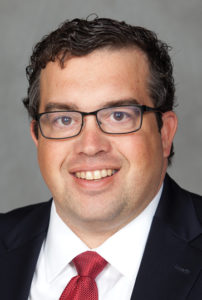
© 2017 by Steve Brawner Communications, Inc.
Michael John Gray can trace his family’s farming heritage in Woodruff County to the year after the Civil War ended. This being Arkansas, it’s a fair assumption that all those generations before him were Democrats. But then, the rest of the state back then was, too.
Gray, D-Augusta, finds himself part of a vanishing breed in the Legislature – rural, white Democrats, which describes somewhere between eight and a dozen of the 135 legislators, depending on how you define “rural.” It wasn’t long ago that it described virtually the entire Legislature, but now Democrats mostly represent the state’s urban areas and those with high minority populations. Overall, Democrats compose only 24 of the 100 members in the House of Representatives and only nine of the 35 senators.
Gray is trying to reverse his party’s fortune as its newly elected state chairman, but he said it’s challenging when the national party is focusing on the wrong things: special elections and “the absurdity of the presidency.” Since President Trump’s election, Democrats nationally have lost four special elections, all in traditionally Republican districts. Democrats poured $25 million into the campaign of Jon Ossof, who was trying to swipe a Republican seat in a Georgia district that almost voted for Hillary Clinton last year. It was the most expensive House election in American history. In the end, Ossof did worse than she had done.
Gray said Democrats created unreasonable expectations in districts they traditionally have lost. The story could have been how they almost beat the Republicans on their home fields. Instead, it was that the Democrats lost again.
“Drop $30 million in Arkansas, and I have a fair shot at changing the face of the Legislature,” he said.
If Democrats are to change their party’s recent trajectory, they’ll have to learn lessons from places like Gray’s district, which voted for President Obama in 2012 and for the Democrats’ Senate candidate, Conner Eldridge, in 2016. But it also voted for Trump rather than Clinton.
Gray said the presidential election showed there’s a disconnect between working class Americans and the party’s base. Meanwhile, he said Democrats are “screaming about Trump” when they should be talking about crumbling roads, children going to bed hungry, and senior citizens who “have to choose between eating pet food or paying their light bill.”
And of course, there’s health care, which national Republicans are struggling mightily to change with a bill polls show is unpopular. In Arkansas, Democratic Gov. Mike Beebe’s administration implemented the private option, the program now called Arkansas Works that provides health insurance for 300,000 Arkansans. It happened in part thanks to young, creative Republican legislators. But Gray said it was made possible by Obamacare, a fact Democrats haven’t communicated well.
Those kinds of issues are important, and Arkansas Democrats like Gray are comfortable talking about them. First, however, they have to get people to listen, which can be difficult when hot-button social issues grab so much attention. Recently, Democratic National Committee Chairman Tom Perez said being pro-choice on abortion is “not negotiable,” a hardline position that brought objections from even liberal leaders including Rep. Nancy Pelosi and Sen. Bernie Sanders.
Gray disagrees, too, saying abortion should not be a litmus test. Meanwhile, he said Democrats should argue their policies will lead to fewer abortions by helping the poor and increasing access to birth control, rather than the Legislature passing abortion limitations that later are ruled unconstitutional.
Meanwhile, things happen like the guy knocking down the Ten Commandments monument at the Capitol. Gray said he “immediately cringed” when he heard the news – first, because it’s a terrible act, and second because he knew some would blame the actions of the disturbed driver on “the intolerant left.”
“We’ve got to find a way to quit feeding that story a little bit,” he said.
Can Democrats change minds, or at least move the conversation away from the issues that hurt them in a religiously conservative state to the issues that might resonate in a poor one? Gray said it won’t be easy and it will take time. But clearly, screaming about President Trump isn’t working.
“Nothing that’s been good has been built by tearing something else down,” he said. “It has been from building on what you have, and I think that’s what we’ve got to refocus on a little bit.”
